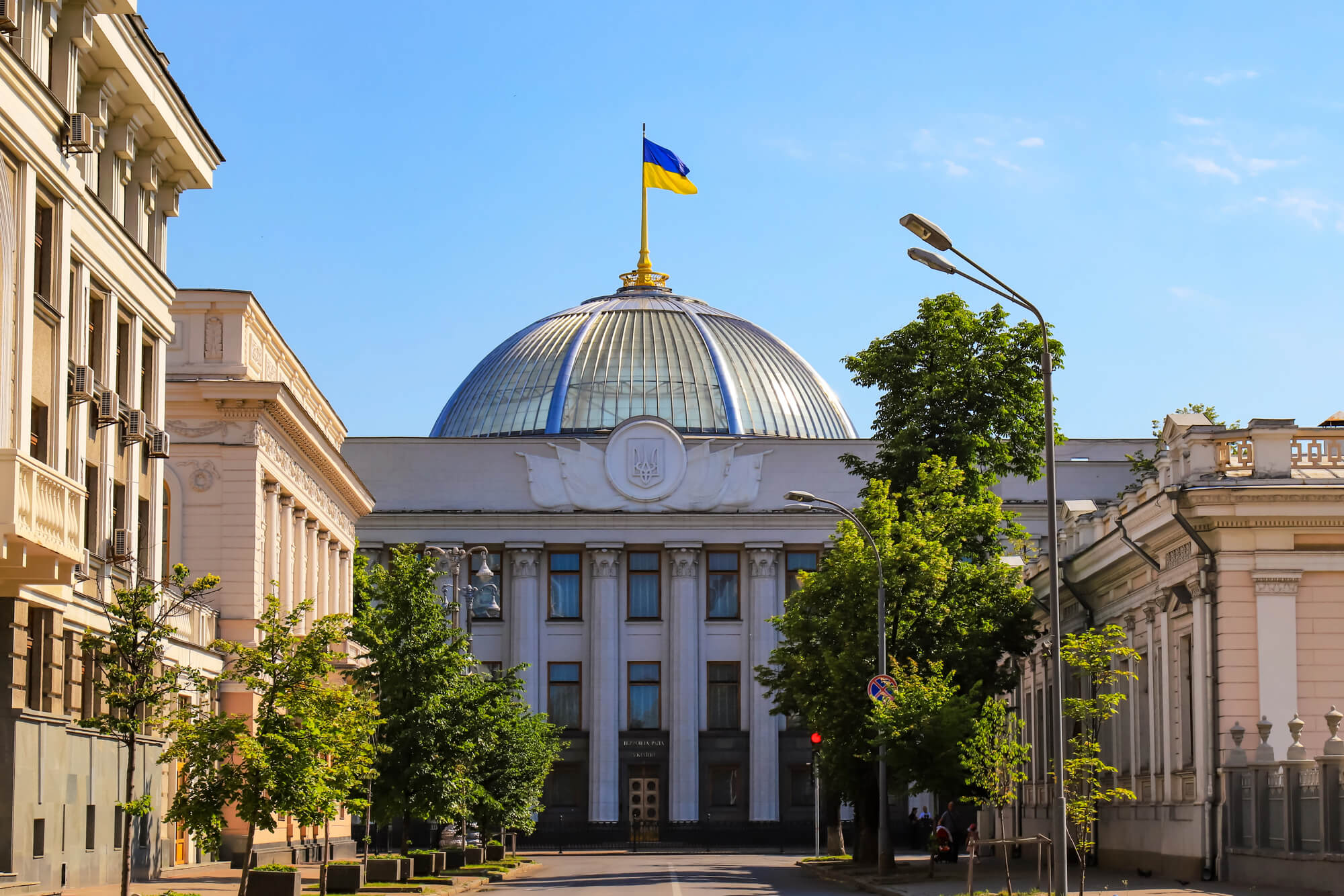Key conclusions
- Among the 163 important regulations changing the rules of the game in the country in the opinion of Index for Monitoring Reform (iMoRe) experts, 89 are laws. Of these, 70 were initiated by MPs, ten by the Cabinet of Ministers, and nine by the President.
- In 2021, 309 out of the 423 MPs of the ninth convocation initiated at least one bill included among reforms or anti-reforms in the Index.
- Danylo Hetmantsev became the biggest reformer among the top three, the other two being Yuliia Hryshyna and Dmytro Liubota. Overall, three women and nine men were among the top twelve reformers scoring slightly better than the others. All of them were from the Servant of the People faction.
- Most of the active MPs (90%) came from the Holos and Servant of the People factions. Dovira was in third place. MPs from OPFL proposed the least number of economic reforms.
- Women were more active in initiating reforms than men: 89% of women initiated laws included in the Index, with the proportion of active male MPs being 70%. The women’s average score in the rankings was also higher than that of men, namely 4.8 vs. 2.7.
- Among the seven anti-reform MPs (listed in the rankings with a negative score: from -0,3 to -1), six were male (Yaroslav Rushchyshyn, Mykola Skoryk, Oleh Voronko, Mykola Kyrychenko, Roman Mulyk, and Oleh Seminsky) and one female (Nina Yuzhanina). They represent the Servant of the People, Holos, European Solidarity, and OPFL factions.
- Some factions’ public “faces” (Petro Poroshenko, Yuliia Tymoshenko, Viktor Medvedchuk, and Yuriy Boyko) did not propose a single law listed in the Index in 2021. The “faces” of the Servant of the People and Holos factions landed in the middle of the rankings. For instance, Kira Rudyk from Holos ranked 173rd with an overall score of 3 for co-authoring two bills. Oleksandr Ustinov (Holos) ranked 187th, scoring 2 points for initiating two bills. The Servant of the People faction’s leader, Davyd Arakhamiya, placed 27th with an overall score of 10 for eleven bills.
In 2021, iMoRe experts identified 163 regulations that significantly impact the economic “rules of the game” in Ukraine. Of these, 146 received positive scores, twelve scored zero points, and five were anti-reform. Here belong 89 laws, 43 resolutions and two decrees by the Cabinet of Ministers, 23 resolutions by the National Bank of Ukraine (NBU), four regulations by other public bodies, one presidential decree, and the launch of a new service – repo with risk control (Figure 1).
Figure 1. Reform documents by type, number
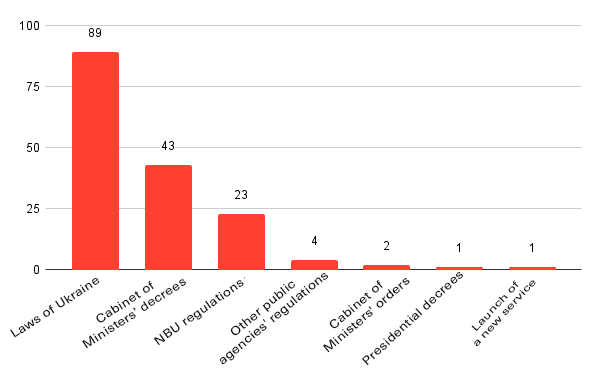
Figure 2. Overall score of the bodies that initiated laws
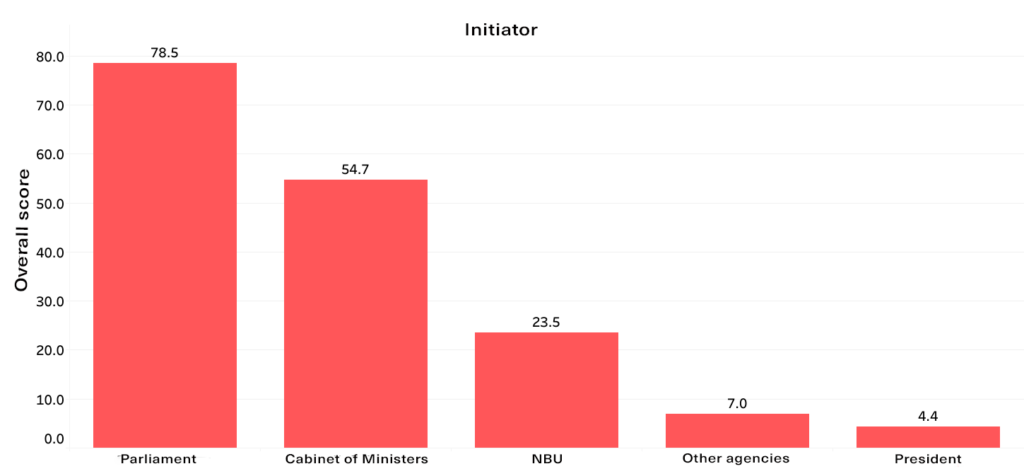
Large-scale changes in the country are implemented through laws. Therefore, we analyzed who drafted the majority of bills and submitted them to the Verkhovna Rada.
Sometimes the actual authors of the bills remain “in the shadows.” Ministries and the NBU submit their bills through MPs or the President. However, it is almost impossible to identify the “real” initiators of legislation from open sources. That is why, in this study, we rely on the formal initiators indicated in the bill cards.
MPs initiated most rule-changing bills from January 1 to December 31, 2021 (Figure 2). During this period, they drafted 70 bills, of which 64 received positive scores from experts, three received zero points, and three were considered anti-reform. The latter are laws on reducing the VAT rate for some types of agricultural products (iMoRe No.155), on ensuring financial stability in the natural gas market (iMoRe No.167), and on excluding gas procurement from the application of the public procurement law (iMoRe No.152).
Figure 3. Reform bills by subject of legislative initiative
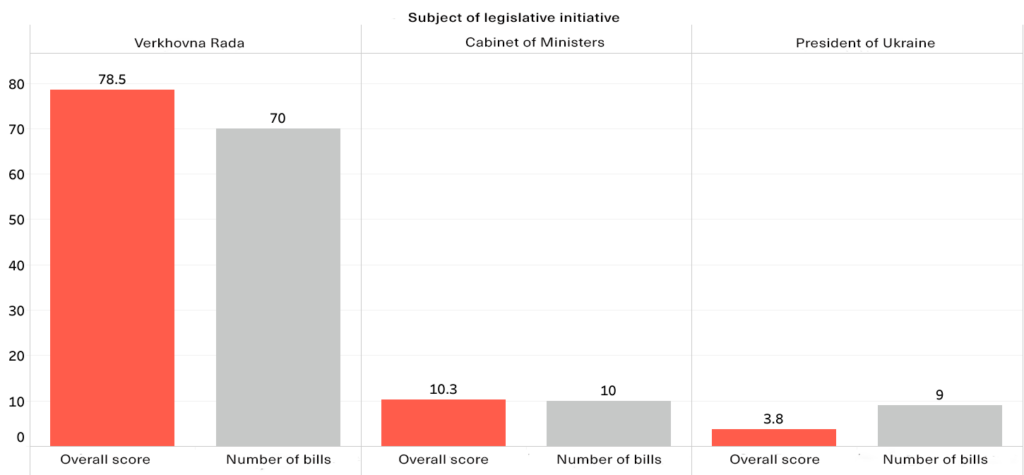
Since most of the rule-changing laws were initiated by MPs, we wondered who made the greatest efforts to implement reforms in the country. We compiled rankings of MPs based on the iMoRe scores of the bills they initiated. For each bill they proposed, MPs received the number of points that iMoRe experts assigned to the bill after it was passed. Thus, a deputy who proposed one law scoring 3 points would get the same rating as a deputy who initiated three laws scoring one point each. In this way, each MP received a certain number of points for the reforms they proposed. Based on this data, we can see which factions have the most reform-minded MPs, their age, as well as who is older among the reformers: men or women, etc.
In 2019, 424 MPs were elected to the Verkhovna Rada of the ninth convocation. However, five MPs left elected office prematurely. These were Oleksandr Skichko from Servant of the People and Ihor Kolykhayev from For Future, appointed heads of the Cherkasy and Kherson regional state administrations, respectively. Among the other MPs who left Parliament prematurely were Iryna Vereshchuk (currently Deputy Prime Minister and Minister for Reintegration of the Temporarily Occupied Territories of Ukraine), Denys Monastyrskyi (Minister of the Interior), and Anton Polyakov, who died on October 8, 2021. Serhiy Kozyr, Vitaliy Voitsekhivsky, Serhiy Kostriychuk, and Anton Shvachko from Servant of the People became MPs in place of them. There are currently 423 MPs of the ninth convocation.
They ended the year with the following results: 296 received positive scores in the rankings: from 0.2 to 25.6. Seven MPs received negative scores: from -0.3 to -1. Six deputies drafted laws that got zero iMoRe scores, giving their initiators no points. Another 114 MPs initiated no reform laws during the year and were excluded from our rankings.
As a result, 309 incumbent MPs were listed in the rankings, occupying 78 places (some MPs had identical final scores for the laws they initiated).
In 2021, law #1320-ІХ was passed, enabling local governments to monitor compliance with labor legislation (iMoRe No.167, +0.8 points). The bill was “inherited” by the current Parliament from the Parliament of the previous convocation. 18 MPs of the eighth convocation had taken part in its development and registration, namely: Oleksiy Poroshenko, Ivan Melnychuk, Roman Matsola, Andriy Shinkovych, and Andriy Vadatursky (Petro Poroshenko’s Bloc); Tetiana Ostrikova, Serhiy Kiral, and Roman Semenukha (the Samopomich Association); Viktor Halasiuk and Ihor Popov (Oleh Liashko’s Radical Party); Mykhailo Khmil and Hennadiy Kryvosheya (People’s Front); Oksana Prodan (UDAR); Oleksandra Kuzhel (Batkivshchyna); Oleksandr Nechayev (Opposition Bloc); and non-partisan MPs Boryslav Rozenblat, Oleksandr Dubinin, and Valentyn Didych. Each of them got 0.8 points for this law. However, we did not include this law and the respective MPs in the rankings.
Teamwork
In 2021, 309 MPs initiated at least one law included in the Index for Monitoring Reform (with a positive or negative score). 63 of the 70 reform laws were initiated by deputy groups, often from different factions. Only seven laws had one initiator. These were the laws on financial leasing (initiated by Danylo Hetmantsev), on selling seized mortgaged property and on expanding the range of hotel service providers (Ihor Fris), on allowing local governments to receive humanitarian aid (Mykhailo Laba), on allowing local governments to monitor compliance with labor laws), the law on expanding the powers of AMK (Roksolana Pidlasa), and the law on certifying the electricity transmission system in line with EU requirements (Andriy Herus).
Figure 4. Bills included in the Index, by number of initiators
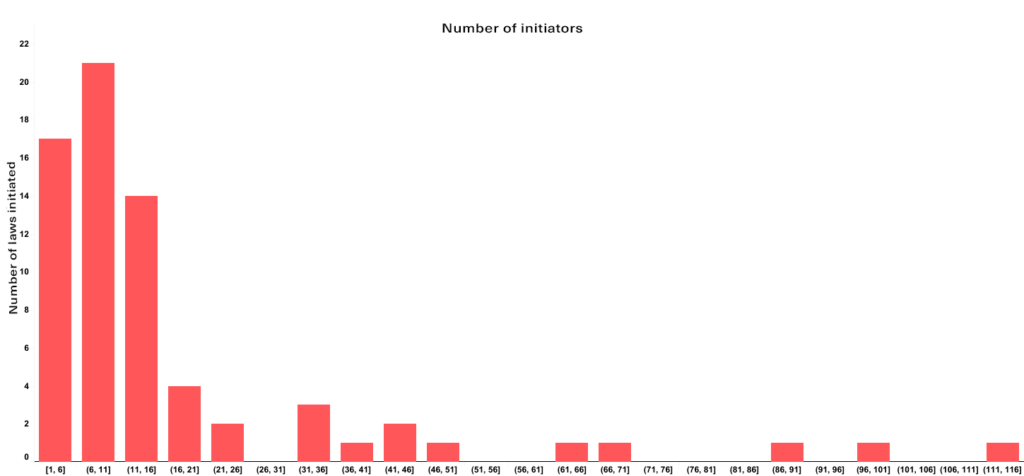
Most often, MPs submitted bills by small groups of up to 16 co-authors (Figure 3). But sometimes, many more MPs joined them. The following five bills have the most co-authors: on the peculiarities of providing electronic public services (iMoRe No.166) – 116 initiators; on a streamlined procedure for connecting small and medium businesses to the grid (iMoRe No.167) – 98 initiators; on giving mothers and fathers equal parental leave rights (iMoRe No.160) – 87 initiators; amendments to the law on the National Asset Recovery and Management Agency (iMoRe No.166) – 70 initiators; and on special tax conditions for Diia.City residents (iMoRe No.176) – 63 initiators.
Figure 5. Points scored by MPs who initiated at least one (anti)reform
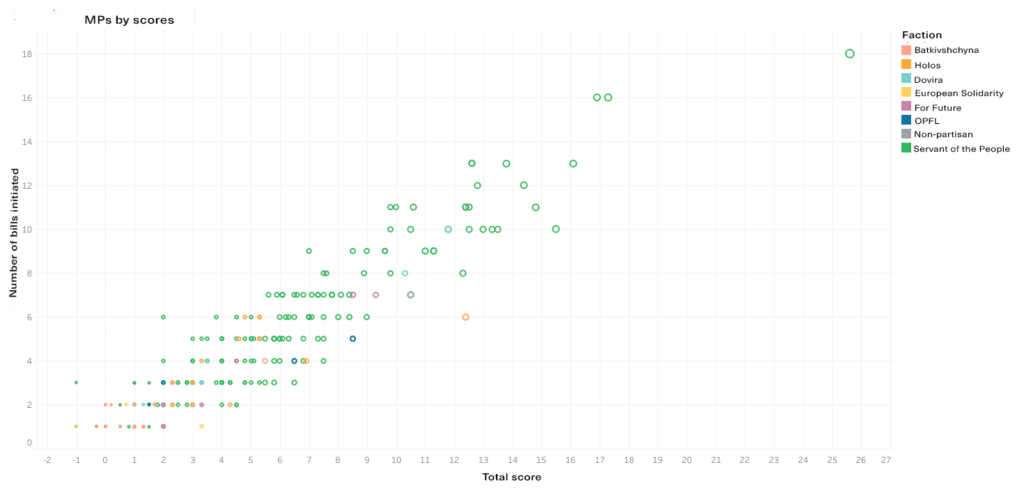
The magnificent dozen
The highest scores (from 25.6 to 12.8) were awarded to 12 MPs. These were Danylo Hetmantsev (scored 25.6 points for working on 18 bills), Yuliia Hryshyna (scored 17.3 points for her participation in the development of 16 bills), Dmytro Liubota (16.9 points for 16 bills), Viktoriia Kinzburska (16.1 points for 13 bills), Serhiy Shtepa (15.5 points for ten bills), Yehor Cherniev (14.8 points for 11 bills ), Volodymyr Vatras (14.4 points for 12 bills), Halyna Tretyakova (13.8 points for 13 bills), Oleksandr Kovalchuk (13.5 points for ten bills), Oleksandr Fediyenko (13.3 points for ten bills), Andriy Motovylovets (13 points for ten bills ), and Andriy Klochko (12.8 points for 12 bills). All of them are MPs from the Servant of the People faction.
Follow this link to see the infographics of the full MP rankings.
Interestingly, the public “faces” of the Batkivshchyna, European Solidarity, and OPFL factions, i.e. the MPs appearing most often in political talk shows did not initiate any reform bills in 2021. These include Yuliia Tymoshenko, Yuriy Boyko, Viktor Medvedchuk, Nestor Shufrych, and Petro Poroshenko. These MPs were frequent guests on TV channels and came under scrutiny from VoxCheck for their strong public statements. However, they showed no enthusiasm for reforms.
The “faces” of the Holos and Servant of the People factions ended up in the middle of our rankings. For instance, the head of the Holos faction, Oleksandra Ustinova, worked on two important bills earning her two points and moving her into 187th place in the rankings. MP Kira Rudyk won 173rd place with an overall score of 3 for co-authoring two bills. The Servant of the People faction’s leader, David Arakhamiya, placed 27th with an overall score of 10 for co-authoring eleven bills. The head of the Dovira faction, Oleh Kulinich, received 3.3 points for working on three draft laws winning 149th place. The head of the For Future faction, Ihor Palytsia, ended up 210th scoring 2 points for working on a bill to streamline the procedure for connecting small and medium businesses to the grid.
To objectively evaluate the activities of the 114 MPs who proposed no iMoRe laws in 2021, we decided to use our other tool, namely MPs’ efficiency rankings. It assesses the legislators’ overall activity: the number of sessions they attended, their participation in voting, and supporting reforms.
Figure 6. MPs not included in the rankings based on their votes for reform (efficiency rate)
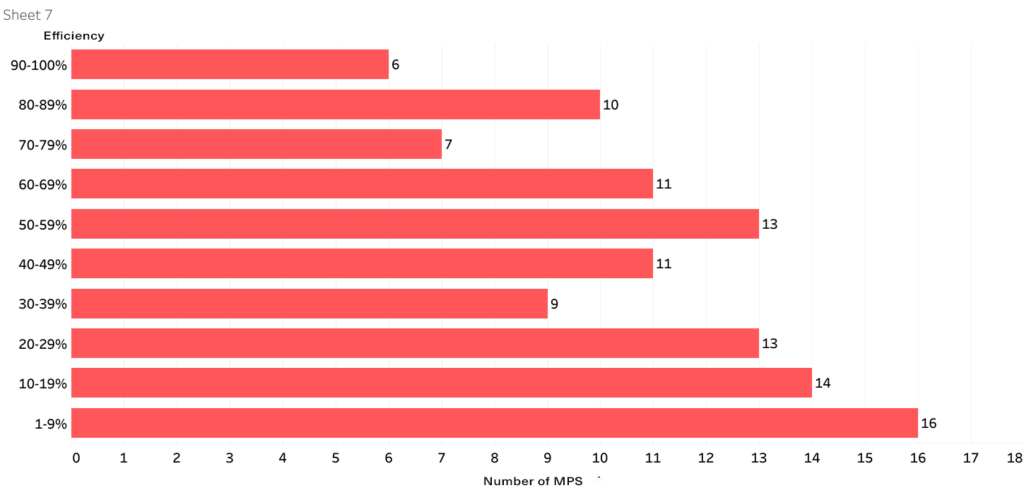
As can be seen from the Figure, six MPs did not co-author laws included in the Index but actively participated in the voting supporting important initiatives. For instance, Volodymyr Hevko (Servant of the People) ranked first with an overall MP efficiency rate of 96%. This MP attended nearly all parliamentary sessions (83%) and participated in almost all votes (94%). The same applies to MPs Oleksandr Pasichnyi (96%), Serhiy Kalchenko (96%), Maksym Zaremskyi (95%), Volodymyr Kozak (91%), and Dmytro Kostiuk (91%).
However, most MPs (sixteen) did not actively participate during the year. Neither did they submit or support important laws. In particular, Vadym Rabinovych (OPFL) ranked last with an efficiency rate of 1%. This MP attended only 37% of the meetings and skipped nearly all votes. Overall, MPs from OPFL were the idle ones: the efficiency rate of this faction’s ten deputies who did not initiate any economic reforms does not exceed 9%. In addition to Rabinovych, these were Vadym Stolar (2%), Serhiy Lyovochkin and his sister Yuliia Lyovochkina (3% each), Taras Kozak (3%), Yuriy Boyko (3%), Yuriy Solod (4%), Nataliia Korolevska (6%), Viktor Medvedchuk (7%), Oleksandr Feldman (8%), Oleksandr Puzanov (8%), Vitaliy Bort (8%), and Fedir Khrystenko (9%). Non-partisan MPs Dmytro Shentzev (7%) and Andriy Derkach (4%), and MP Stepan Ivakhiv from For Future (7%) also had an efficiency rate below 10%.
Which faction initiated most reforms?
Most MPs (by number) who developed and submitted the rule-changing bills were from the Servant of the People faction. It is understandable since it is much easier for the largest faction to initiate and ensure the adoption of bills compared to opposition factions. Holos placed second in the rankings, with Dovira third.
Next, we will assign rankings to factions by the percentage of MPs who initiated at least one important bill.
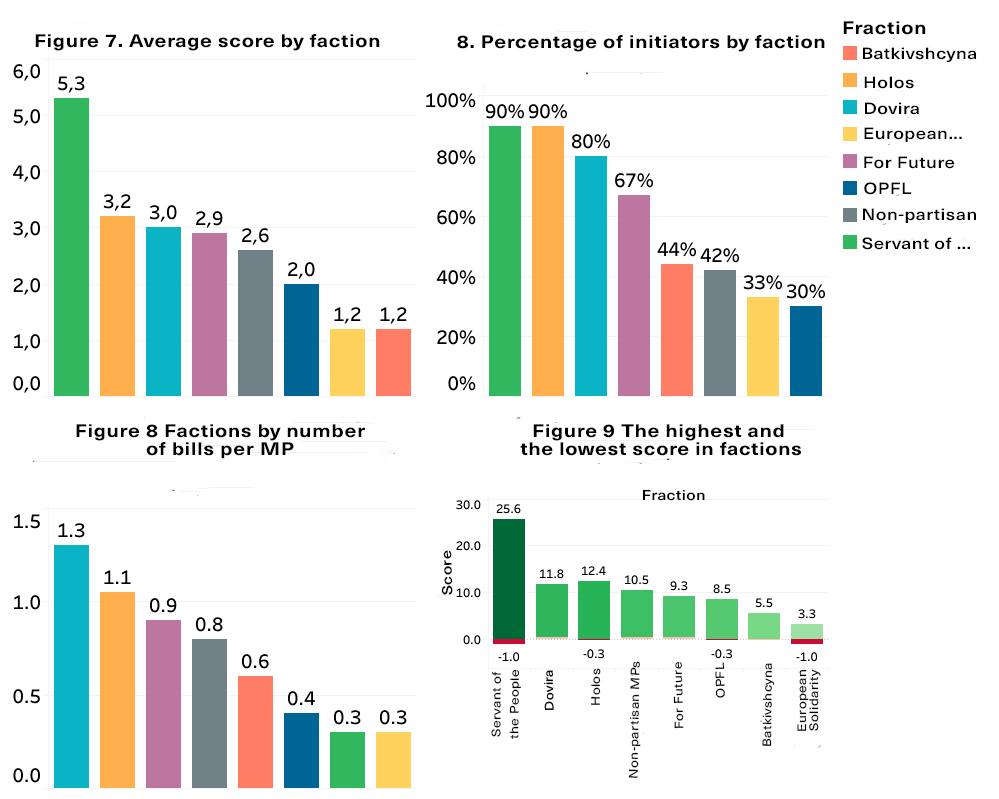
Servant of the People: 90% active MPs
The Servant of the People faction has 242 MPs, of which 212 received positive scores: from 0.5 (Ostap Shypailo and Dmytro Naliotov) to 25.6 (Danylo Hetmantsev). However, the faction also has the largest number of anti-reformers (four). These include Oleh Voronko and Mykola Kyrychenko scoring -1 point for the law on reducing the VAT rate on some types of agricultural products, and Oleh Seminskyi and Oleh Mulyk scoring -1 point for the law on ensuring stability in the natural gas market.
MPs from Servant of the People submitted 69 out of the 70 “deputy” laws in the Index.
The faction had a mean score of 5.3 and a median score of 4.5.
Holos: 90% of active MPs
The Holos faction has 20 MPs, 17 of whom received positive scores: from 1 (Olha Stefanyshyna, Andriy Osadchuk, Oleh Makarov, and Roman Kostenko) to 7.5 points (Yaroslav Zhelezniak). Yaroslav Rushchyshyn became the faction’s anti-reformer, scoring -0.3 points for participating in submitting the law on excluding gas procurement from the application of the public procurement law.
This faction’s members engaged in drafting bills in the financial, educational, energy, and social spheres, and legislation related to digitalization, public governance, and business regulation. Overall, the Holos MPs took part in initiating 21 important bills.
In 2021, they had a mean score of 3.2 and a median score of 3.
Dovira: 80% of active MPs
The faction has 20 MPs, 16 of whom received positive scores. Serhiy Shakhov received the lowest score (0.5), and Hennadiy Vatsak the highest (11.8). There were no anti-reform MPs in Dovira in 2021.
The faction’s members initiated 25 important bills, mainly relating to the financial sphere, education, enhanced administrative services, business regulation, and law enforcement.
In 2021, the faction had a mean score of 3 and a median score of 1.8.
For Future: 67% of active MPs
Out of 21 MPs from the For Future faction, 14 received positive scores. MP Iryna Konstankevych received the lowest score of 0.5, and Dmytro Lubinets the highest (9.3). This faction, too, had no anti-reform MPs.
For Future’s MPs submitted 19 bills relating to the financial sphere, education, digitalization, energy, and public governance.
In 2021, the faction had a mean score of 2.9 and a median score of 2.
Batkivshchyna: 44% of active MPs
The Batkivshchyna faction has 25 deputies, nine of whom received positive scores. Serhiy Taruta received the lowest score (0.2) and Aliona Schkrum the highest (5.5). There were no anti-reformers in this faction either.
The faction’s MPs engaged in drafting 14 bills in areas such as education, digitalization, the social sphere, and energy.
The faction had a mean score of 1.2 and a median score of 1.
Non-partisan: 42% of active MPs
There are 24 non-partisan MPs in the Verkhovna Rada. In this group, ten received positive scores: from 0.5 (Vadym Novynskyi, Roman Ivanisov, and Viktoriia Hryb) to 10.5 points (Roman Sokha). There were no anti-reform MPs in the non-partisan group.
They submitted 20 bills, mainly on education, digitalization, business regulation, and energy.
The non-partisan group had a mean score of 2.6 and a median score of 1.
European Solidarity: 33% of active MPs
Eight of the 27 MPs in the European Solidarity faction received positive scores: from 0.5 (Iryna Friz) to 3.3 (Artur Herasymov). In 2021, Nina Yuzhanina became the faction’s anti-reform member due to participating in submitting the bill on reducing the VAT rate on some types of agricultural products.
The faction’s members drafted nine important laws related to digitalization, sectoral development, and energy.
The faction had a mean score of 1.2 and a median score of 1.
OPFL: 30% of active MPs
Out of the 44 members of the OPFL faction, 11 MPs received positive scores: from 0.5 (Viktor Chornyi, Volodymyr Moroz, and Valeriy Hnatenko) to 8.5 points (Serhiy Larin). Mykola Skoryk became the faction’s anti-reform member, receiving -0.3 points for initiating the law on excluding gas procurement from the application of the public procurement law.
MPs from OPFL submitted 18 important bills. Among them were financial, social, energy, and digitalization laws.
The faction had a mean score of 2 and a median score of 1.
Reform initiators by age
A study conducted in the Czech Republic found that legislators’ age positively affects their voting attendance and activity, while tenure does so in a negative direction. Older MPs propose more bills. More experienced representatives address more speeches compared to their younger colleagues. We decided to see to what extent these results apply to the initiators of economic reforms in Ukraine.
Figure 7. Bills’ initiators by age
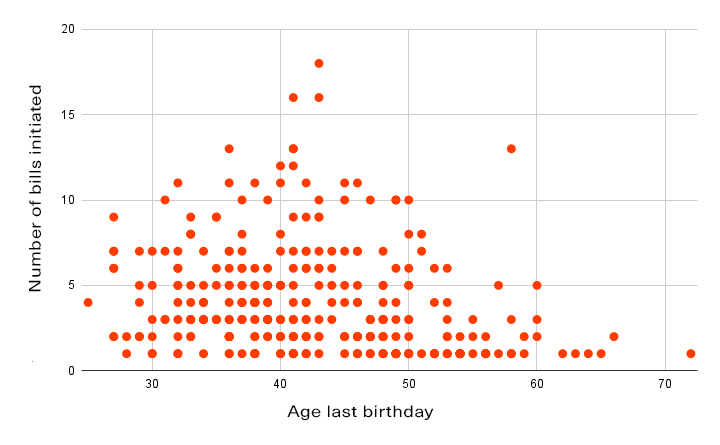
Figure 7 suggests no relationship between age and the number of bills initiated in Ukraine. Middle-aged MPs initiated most of the reform bills.
The age of the eleven MPs topping the rankings ranged from 31 (Serhiy Shtepa, 5th place) to 58 years old (Halyna Tretyakova, 8th place).
Most legislators are 41 years old. However, the women initiating reforms are a little younger: most of them are 36 years old.
The oldest MP listed in our rankings is Hryhoriy Surkis, 72 years old. In 2021, he initiated a law on the basic principles of youth policy, which received zero scores and added no points to the MP’s ranking. The oldest woman in the rankings is Halyna Tretyakova (Servant of the People), 58 years old. In the overall rankings, she placed 8th landing among the top twelve biggest reformers.
The youngest MP in our rankings is 25-year-old Svyatoslav Yurash (Servant of the People). He worked on laws on peculiarities of providing electronic public services, giving mothers and fathers equal parental leave rights, streamlining the procedure for connecting small and medium-sized businesses to the grid, and the law on the basic principles of youth policy. These documents gave him four points. 27-year old Anna Kolisnyk from Servant of the People became the youngest active MP. Overall, this legislator worked on drafting six important laws: on enhancing the activities of the National Bank of Ukraine (NBU), on simplifying currency controls for banks, on establishing the Bureau of Economic Security, giving mothers and fathers equal parental leave rights, and the law on basic principles of fiscal policy. Kolisnyk received 6.5 points for her ranking.
Are there more women or men among the reformers?
Our rankings list the 72 female MPs that initiated at least one reform per year out of the 82 female legislators working in Parliament. Thus, the proportion of active female legislators was 89%. The MPs’ mean score was 4.8, with their median score being 4.
Yuliia Hryshyna received the highest positive score, placing second in the overall rankings. Nina Yuzhnina from European Solidarity had the least points (-1), being the only anti-reform female MP.
Among the male MPs, 237 initiated at least one reform in 2021, which amounted to 70% of MPs. The mean was 2.7, and the median was 1, which was also lower than female MPs.
Overall rankings leader Danylo Hetmantsev received the highest score. The lowest score went to four anti-reformers from the Servant of the People faction (-1 point).
What was initiated by the Cabinet of Ministers and the President
Not only MPs initiated reform laws in 2021. The Cabinet of Ministers and the President of Ukraine Volodymyr Zelensky did too.
Last year, the Prime Minister of Ukraine, Denys Shmyhal, registered ten bills in the Verkhovna Rada that were passed and included in the Index. Most of the laws he initiated were sectoral reforms: on industrial parks (iMoRe No.170), state support for agricultural insurance (iMoRe 165), incentivizing farms (iMoRe No.171), multimodal transportation (iMoRe No.175), and accelerated registration of drugs (iMoRe No.173). In addition, the Cabinet of Ministers initiated laws on mediation (iMoRe No.175), on enabling foreigners and stateless persons to get Ukrainian biometric visas (iMoRe No.157), and on amendments to the Tax Code to ensure the balance of budget revenues (iMoRe No.176). The good news is that there were no anti-reform laws among those initiated by the Cabinet of Ministers. So its overall score was 10.3.
Volodymyr Zelensky initiated nine laws in 2021. They related mainly to the judiciary, law enforcement, and taxation. The laws on enforcing criminal liability for false declarations (iMoRe No.165), on the procedure for electing members of the High Council of Judges (iMoRe No.166), and on the all-Ukrainian referendum (iMoRe No.158) resulted in his receiving positive scores. Many presidential laws received mixed reviews from experts and scored zero. These were the law on investment nannies (iMoRe No.154), on preventing oligarchs from having excessive influence (iMoRe No.172), as well as two laws relating to the “tax amnesty” package: on releasing declarants from liability for violating currency legislation (iMoRe No.163) and on relieving from liability for willful tax evasion in case of submitting a special, one-time voluntary declaration (iMoRe No.165). However, the key tax amnesty law (iMoRe No.165) was negatively evaluated by iMoRe experts. The President’s overall score was 3.8.
Attention
The author doesn`t work for, consult to, own shares in or receive funding from any company or organization that would benefit from this article, and have no relevant affiliations



